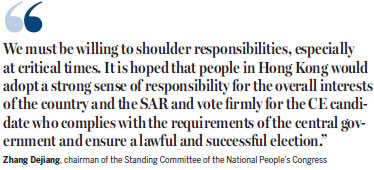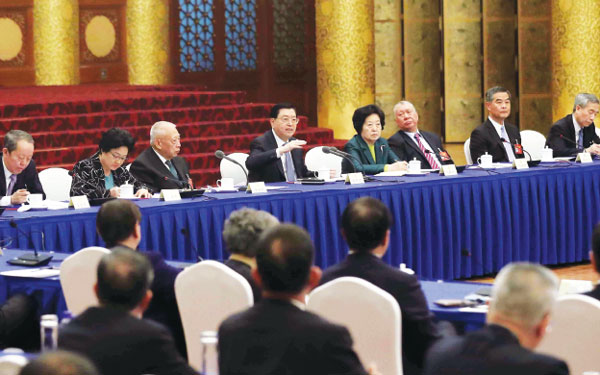 时刻新闻
时刻新闻
The following are excerpts of a speech by Chairman Zhang Dejiang of the National People's Congress Standing Committee during a panel discussion with political advisers from the HK and Macao Special Administrative Regions at the 5th session of the 12th National Committee of the Chinese People's Political Consultative Conference in Beijing on Saturday.
The Hong Kong Special Administrative Region will soon celebrate the 20th anniversary of its return to the motherland, and the Macao Special Administrative Region has returned for almost 18 years. Over these years, the practice of "One Country, Two Systems" in the two SARs has experienced ups and downs. But, all in all, it is successful.
When the country fares well, so will Hong Kong and Macao. That is why we have full confidence in the two SARs. The underlying reason is that "One Country, Two Systems" is a perfect arrangement. Practice has provided a strong testimony to the fact that "One Country, Two Systems" is not only the best solution to the historical issues associated with Hong Kong and Macao, but also the best recipe for the two SARs to sustain their prosperity and stability for a long time to come.
Not only has "One Country, Two Systems" enabled the country to resume the exercise of its sovereignty in the two cities, it has also allowed them to retain their uniqueness and strengths to the fullest extent. "One Country" opens the vast mainland market to Hong Kong and Macao so that they could share the opportunities provided by the rapid development of the country's economy. It also affords the two SARs the country's staunch support when they run into difficulties. "Two Systems", on the other hand, provides a channel through which the two SARs could leverage their advantages in the capitalism-dominated world economy and become the pioneers and testing grounds for the country's reform and opening-up policy, hence enjoying a clear head start in the country's economic development. The SAR and mainland economies supplement each other while moving ahead side by side.

Currently, the rest of the world is scrambling to jump onto our country's economic express train, hoping to strengthen exchange and cooperation with us in all aspects. Riding on the country's development, Hong Kong and Macao are given the opportunities to take their own developments to a higher level. Given the circumstances, that is absolutely achievable.
The two SARs enjoy the priority to board the mainland's economic express train as we all belong to the same family. While foreign countries have to wait in line to get on it, the two SARs are given reserved seats. That is the advantage of "One Country, Two Systems" which Hong Kong and Macao should fully exploit. Shenzhen, for example, has made good use of the country's reform and opening-up policy to transform itself from a small fishing village into a metropolitan city. Now that the country is launching the 13th Five-Year Plan (2016-20) that delivers very rosy prospects, Hong Kong and Macao ought to get on board this express train as soon as possible and expedite their own developments.
HK and Macao should focus on economy
Hong Kong's economy reached HK$2.3 trillion in value last year; while Shenzhen's rose to 1.9 trillion yuan (HK$2.1 trillion). When Shenzhen's economy outgrows Hong Kong's in two or three years' time, how would you feel about it? Wouldn't you be worried? Wouldn't you want to put economic development on top of your priorities? Or would you rather be obsessed with politics until you are completely consumed? Can you survive on street politics? Can it solve livelihood issues? That is why Hong Kong and Macao should make prosperity and stability their first priority. That is why maintaining prosperity and stability is the two SARs' top mission. That is why "One Country, Two Systems" is the best arrangement and must be carried out to its full potential. What I mean essentially is in the best interest of the nation as well as of Hong Kong and Macao.
I believe by upholding the fundamentals of "One Country"; doing its best to help maintain national unity, territorial integrity, sovereignty and security; taking full advantage of the "One Country, Two Systems" policy; seizing opportunities provided by the country's development; and enthusiastically joining the country's development strategy, the Hong Kong and Macao communities will be able to share the benefits of prosperity and stability from joint development with the mainland.
One more important point: Hong Kong and Macao have their own unique advantages. For example, both are free, open cities and free ports; Hong Kong has been rated the freest economy in the world for 23 years in a row - a shining magnet attracting capital from around the world. And both cities connect the mainland with the rest of the world as conduits and platforms. Hong Kong is a two-way service platform for the country to go out and the rest of the world to come in. The two SARs also enjoy an edge in "soft power", such as the legal system, accounting system, Hong Kong's strength in international finance, good business environment, clean government and efficiency, and so on. All these are advantageous "soft power" the mainland desperately needs and still has a long way to get there. This is, in fact, where Hong Kong could play a role, including contributing to the Belt and Road Initiative. We have full confidence in Hong Kong and Macao because of the "One Country, Two Systems" constitutional arrangement and their own unique advantages.
The central government strongly supports Hong Kong and Macao and the motherland acts as the staunch backing for the two SARs. This is an advantage not available to any foreign country or region in cooperation with our country. The 13th Five-Year Plan includes elevating Hong Kong and Macao's roles in the nation's economic development and opening to the outside world. It shows the central government attaches great importance to Hong Kong and Macao when it comes to planning for national development as a whole. Premier Li Keqiang announced a series of tailor-made policies and measures during a visit in Macao last year; while I conveyed the central government's decision to introduce some policies and measures in support of Hong Kong's participation in the Belt and Road Initiative when I attended the 2016 Belt and Road Summit in Hong Kong. Also last year, the Shenzhen-Hong Kong Stock Connect was launched; and the Closer Economic Partnership Arrangement was expanded yet again. Such supportive policies and measures for the two SARs are designed to fuel their regional development with more economic energy. Hong Kong and Macao will surely achieve sustained strong development if they fully implement those supportive policies and measures and make full use of their own advantages. That is why I have full confidence in Hong Kong and Macao's ability to maintain stability and prosperity. Let's make sure none of our efforts goes to waste.
The fundamental objective of the "One Country, Two Systems" principle is to ensure the long-term prosperity and stability of Hong Kong and Macao. Later this year, both SARs will respectively hold an election that is crucial to their prosperity and stability and therefore deserve the close attention of the residents there. As far as Hong Kong is concerned, it will elect its fifth-term Chief Executive (CE) on March 26, an event many people within and outside the country are highly concerned about.
Central govt has the power to appoint CE
First of all, the central government plays a constitutional role in the CE election. According to the Basic Law, Hong Kong is only a local administrative region under the jurisdiction of the central government; and the Chief Executive is the head of both the SAR and the SAR government.
The CE is accountable to both the SAR and the central government, while the central government is vested with the power to appoint the CE. The appointment power is by all means substantive, not that of a rubber stamp. It is an act that embodies the exercise of the country's sovereignty as well as the central government's jurisdiction over Hong Kong. That is the reason why the CE election is not only a matter within the realm of the SAR's autonomy. It is also a matter that concerns the central government's actual power, the correct implementation of "One Country, Two Systems" and the Basic Law, as well as the central government's overall jurisdiction in Hong Kong. The central government's high degree of concern over Hong Kong's CE election is nothing but natural and inevitable.
Meanwhile, the central government's standards for the CE - loving the country and Hong Kong, being trusted by the central government, being capable to govern, being popular among Hong Kong people - have been set according to the "One Country, Two Systems" principle and the Basic Law, as well as Hong Kong's constitutional role and social realities. These standards are what the central government has consistently upheld and in compliance with what the Hong Kong community expects of their CE.
As we all know, the CE enjoys an important status in Hong Kong and the role the CE plays is crucial. What the central government requires of the CE, therefore, has to be higher than that of other SAR officials. In recent years in particular, the internal and external environments of Hong Kong have undergone dramatic changes, as characterized by deepening economic and social problems, intensifying political frictions, the increasingly arduous tasks of developing the economy and improving people's livelihood, as well as the aggravated issues of safeguarding national sovereignty, security and development interests. All these have made the CE post even more demanding. The next CE must be willing to assume the responsibilities, be able to handle complex situations, and be capable of earning the full trust of the central government. He or she must have the ability to unite Hong Kong people from all walks of life so that they would work together to seize the opportunities for development and foster harmony in society. The central government hereby wishes for a smooth and successful CE election.
At present, China is in a decisive phase of completing the building of a moderately prosperous society in all respects, facing opportunities and challenges from home and abroad. This year is an important stage for the nation in its implementation of the 13th Five-Year Plan. The 19th National Congress of the Communist Party of China will be held in the second half of the year. This year also marks the 20th anniversary of Hong Kong's return to the motherland. So, from both the perspective of either Hong Kong or the country, we all hope that the CE election in Hong Kong could proceed smoothly and produce a CE who could meet the central government's requirements. We would also like to see the candidates engage in a gentleman's race by comparing platforms and abilities and guiding the community to focus on the issues in Hong Kong's economic and social development by practically and realistically summing up lessons learnt.
We must be willing to shoulder responsibilities, especially at critical times. It is hoped that people in Hong Kong would adopt a strong sense of responsibility for the overall interests of the country and the SAR and vote firmly for the CE candidate who complies with the requirements of the central government and ensure a lawful and successful election. I suppose this is what we all hope and what all Hong Kong people hope to see happen.
As far as the Hong Kong and Macao Special Administrative Regions are concerned, with the strong support of the central government, both have risen to the challenges and maintained their prosperity and achieved considerable progress in many areas of development under the leadership of their respective CEs, as well as the concerted efforts of people from all walks of life.
Hong Kong's actual economic growth in 2016 was 1.95 percent, with its consumer prices remaining at a relatively low level and the unemployment rate standing at around 3.4 percent, which is close to full employment. The city successfully defended its position as the freest economy in the world and was one of the front-runners in overall competitiveness. Hong Kong held the sixth-term Legislative Council (LegCo) elections and the fifth-term Chief Executive election committee (EC) election last year, with the patriotic forces maintaining their dominance in the LegCo and the EC and enabling the SAR to stay relatively stable.
Particularly noteworthy is that the National People's Congress Standing Committee (NPCSC) reiterated the principle and bottom line of "One Country, Two Systems" and laid down clear rules through a timely interpretation of Article 104 of the Basic Law of the Hong Kong SAR in response to the illegal farce staged by separatist lawmakers-elect during the LegCo swearing-in ceremony, followed by judicial reviews filed by the CE and the Justice Department seeking the disqualifications of six separatists as LegCo members. These measures dealt a heavy blow to the separatist forces. All these events reacquainted Hong Kong residents with the truth about "One Country, Two Systems" and the Basic Law, as well as firing up the positive energy in Hong Kong society. Nobody is allowed to cross or even touch the bottom line of "One Country, Two Systems", and anyone who attempts to do that must bear the consequences alone.

Zhang Dejiang(center), chairman of the Standing Committee of the National People’s Congress, joins a panel discussion with political advisers from the Hong Kong and Macao Special Administrative Regions at the fi fth session of the 12th National Committee of the Chinese People’s Political Consultative Conference in Beijing on Saturday. The nation’s top legislator hopes the two SARs can seize the opportunities arising from the country’s development while “safeguarding national interests”. Liu Weibing / Xinhua
(HK Edition 03/06/2017 page7)



